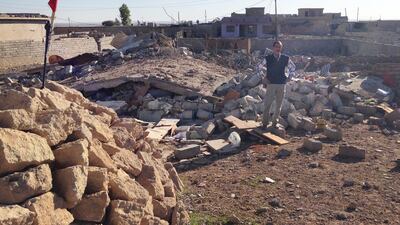DUHOK, Iraq // Mohammed Khader Suleiman is on the verge of tears as he looks at the rubble and debris strewn across his property, the result of intense fighting between ISIL and the Kurdish peshmerga.
“Don’t get much closer, there might be IEDs,” he says, pointing at two red, plastic flags stuck in the ground.
He is among a growing number of Iraqis returning to towns and villages that were once on the front-lines in the fight against the militant group ISIL.
These residents hope for a degree of normality. Yet, they instead discover booby traps, destroyed landscapes, and the threat of looters.
Last week, Mohammed, 53, returned to his village to see what was left of his two houses for the first time since August, when ISIL began a massive offensive that swept large portions of northern Iraq.
Their conquests included Mohammed’s village, situated just outside Zumar, a town two and a half hours’ drive from Erbil, the capital of the autonomous Kurdish region in northern Iraq.
Along with Zumar, ISIL also captured the strategic border town of Rabia, the Yazidi-majority area of Sinjar and the power plant at the Mosul Dam, which provides energy to Mosul and much of the surrounding area.
Kurdish peshmerga quickly mounted a counter-offensive and, backed by air strikes carried out by the United States-led coalition against ISIL, have been able to beat the group back from some areas in the months that followed.
On October 25, Kurdish peshmerga retook Zumar, allowing residents who fled to return.
The bazaar is a mess of smashed windows, rubbish and twisted metal. Throughout the town murals depicting ISIL’s black flag have been painted over by Kurdish graffiti.
Emad Akram, 26, is hunched over in what remains of his family’s barbershop, trying to remove a porcelain sink from the wall.
“I’m taking my stuff because people are stealing it,” he says.
As he loads everything on to a lorry, a military patrol pulls up to make sure Emad is not a looter.
His driver shows them a letter from Iraqi government officials giving Emad permission to clean out his shop.
Emad leaves behind only empty beard-trimmer boxes, an unappealing prize to Salafi militants.
“All they took was my generator,” he says.
Thirty-four kilometres from Zumar, dozens of teenagers play football on the concrete field behind Mosul Dam primary school.
The ethnically diverse community, referred to merely as the Mosul Dam area, has Yazidi, Christian, Turkmen, Arab and Kurdish families. It was retaken by the peshmerga in August.
“They [ISIL] did some stupid things, like taking the Yazidi houses,” says Younes Noaf. “But they didn’t stop us from playing football.”
The teenagers said they did not play much football during the 10 days ISIL held areas around the dam, however, because they were so afraid of the militants.
Fares Ahmed, 57, stands in his driveway in a blue jumpsuit, talking to a friend.
A cheerful man who lives with his extended family, Fares is in the midst of repairing a wall of his house that was damaged when an Iraqi military helicopter bombed a pickup truck parked nearby.
He had initially fled ISIL’s onslaught, but returned to the dam area about six weeks ago. Life is returning to normal, he says.
“Right now we’re trying to get water to the communities where it was cut off,” he says, explaining that new pipelines have to be laid in areas where they had been destroyed.
Unlike Fares, Ahmed Azo, a 62-year-old Kurd, did not flee north into Kurdish territory as ISIL approached. Along with 40 members of his extended family, he moved north to the village of Hamugalu, near Zumar, where they live in a cluster of seven houses. Their home village remains under ISIL control.
“Duhok and Erbil are very expensive. If I rent a house there, it would cost me $800 a month,” he says, explaining why he stayed close to home. He and his family members now live in houses abandoned by residents who fled ISIL. “Here the houses are free,” he said.
As he shows off the village, Ahmed points to a series of earthen mounds in the distance.
These, he says, are mass graves dug by Kurdish forces and filled with bodies of ISIL fighters.
He lists the number of bodies in each: five in the first, four in the second, two in the third, and three in the fourth.
He says the mounds still stink of decaying flesh and that it is unsafe to approach them because peshmerga bomb disposal crews never removed nearby Improvised Explosive Devices.
As he speaks, a thunderous boom rings out in the distance.
A farmer near Zumar has tried to open the door to his house, only to set off an ISIL booby trap, killing himself and two peshmerga officers.
foreign.desk@thenational.ae

